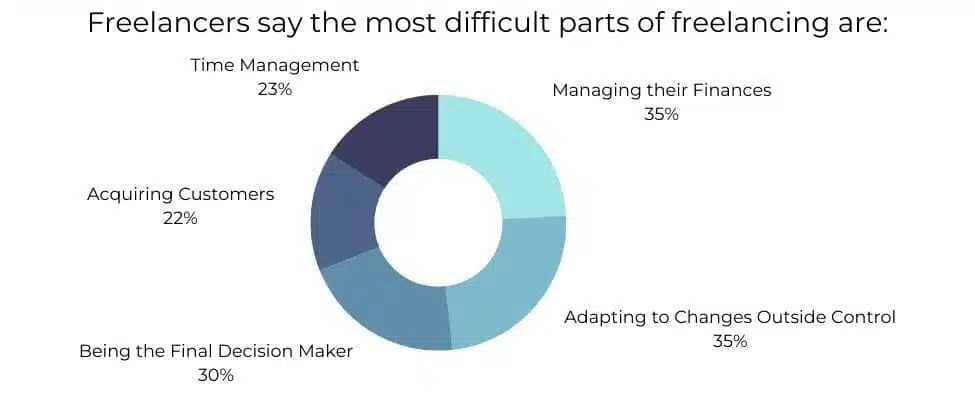All freelancers are in the business of client service, hired to fill gaps and deliver value with precision. Yet the focus on quality and speed often eclipses process issues, and the continual search for the next project leaves little time to evaluate how you work. As a result, you may use more non-billable hours than you should, which hinders profitability and growth.
Utilization Rate is the Canary in the Coal Mine
Your utilization rate is the percentage of time you actually get paid for. To calculate it, divide the hours you bill to the client (billable hours) by total hours worked. Billable hours are spent in direct service of a client. Non-billable activities are those that support your business in general, such as dealing with technology, record keeping, professional development, marketing, building quotes, and more. If you’re not careful, these activities can amount to a non-billable black hole.
As a rule, aim for a utilization rate of 60%-80%. Anything over portends burnout. Anything under hurts profitability. To improve it, you have to reduce your non-billable hours.
The Key to Reducing Non-Billable Hours: Time Management
It’s important to improve time management skills for three main reasons:
- Sustainability. Time management is the most influential factor on longevity as a freelancer. It’s essential to prevent burnout, and the burden falls solely upon you. There’s no benefit in working for yourself if you can’t control your time.
- Scale. Growing a freelance business means responding to opportunity with agility, by taking on more clients, expanding remits, pricing appropriately and hiring help if necessary. To do that, you need solid processes to avoid getting bogged down in non-billables.
- Smooth sailing. Good time management mitigates conflict by helping you deliver on schedule and alert clients early when things aren’t going as planned.
Still, Paro research identifies time management among the top challenges freelancers face:
- Managing their finances and adapting to changes outside of their control (35% for each)
- Being the final decision maker (30%)
- Time management (23%)
- Acquiring customers (22%)

It’s not hard to see why. Many aspects of freelancing make time management especially difficult:
- Keeping detailed records of billable vs. non-billable hours—every call, every email, every thought, every word.
- Tracking disparate payment, billing and tax schedules
- Inaccuracy and errors—typos, document control, forgetting to track, etc
- Schedules that vary month to month, week to week, day to day
- The need to regularly seek and onboard new clients
- Doing all the above without the specialized skills to do so efficiently
Time Management Tips to Reduce Non-Billable Hours
1. Automate task management, time tracking, invoicing and financials.
If you’re logging activities and hours across Excel sheets and note-taking apps, consider investing in software or fractional support to streamline and reduce errors. Many tools cover various aspects of the time management spectrum. Some cover time tracking along with invoicing and expenses, while others cover more to support tax prep—though hiring an expert for taxes is the safest bet.
2. Standardize onboarding and scoping.
Standardized onboarding and scoping processes help you quickly establish deadlines, deliverables, and expectations to avoid time-consuming conversations down the line. Keep track of project types and how long each one takes so you can easily update your next statement of work with learnings.
3. Join a marketplace to reduce job-seeking time.
Marketing yourself isn’t easy—why not let someone else do it for you? As freelancing has become an increasingly important part of business, more companies have formed to connect freelancers with employers. Look for networks like Paro that use AI to match freelance talent with clients who need their precise skills, setting everyone up for success.
4. Follow a routine and structure your work.
This time management tip reducing variables throughout your day that helps cut decision-making time. Try taking a minimalist approach to wardrobe or food choices, chunking out your day to add structure (e.g., calls in the morning, work in the afternoon), or taking the time to plan your week out first thing.
Find more detail in this list of time management tips from Forbes.
5. Work remotely smarter.
- Practice calendar hygiene. Keep a separate calendar for clients updated with availability, holidays, etc.
- Create boundaries. Mr. Rogers had it right. Do something simple that acts as a veil between home and work life, like a 10-minute walk or a cup of tea and an outfit change in the morning and evening.
- Schedule breaks. Modest breaks are billable—recharging is necessary to deliver good work. Bonus: They also function as small deadlines throughout the day.
- Explore productivity and focus techniques. Try the Pomodoro Technique or breathwork grounded in neuroscience.
By joining Paro as a freelance finance expert, you can reduce non-billable hours in a single move, as we do everything from finding you new clients to streamlining scoping, time tracking and invoicing.






